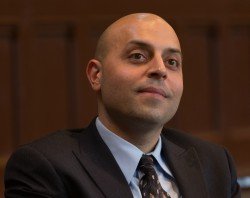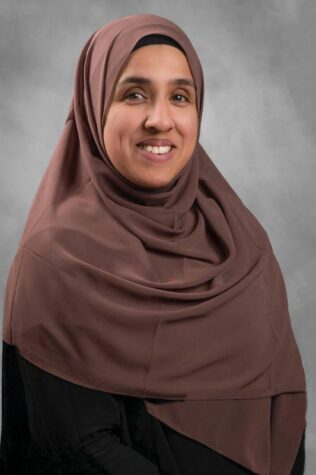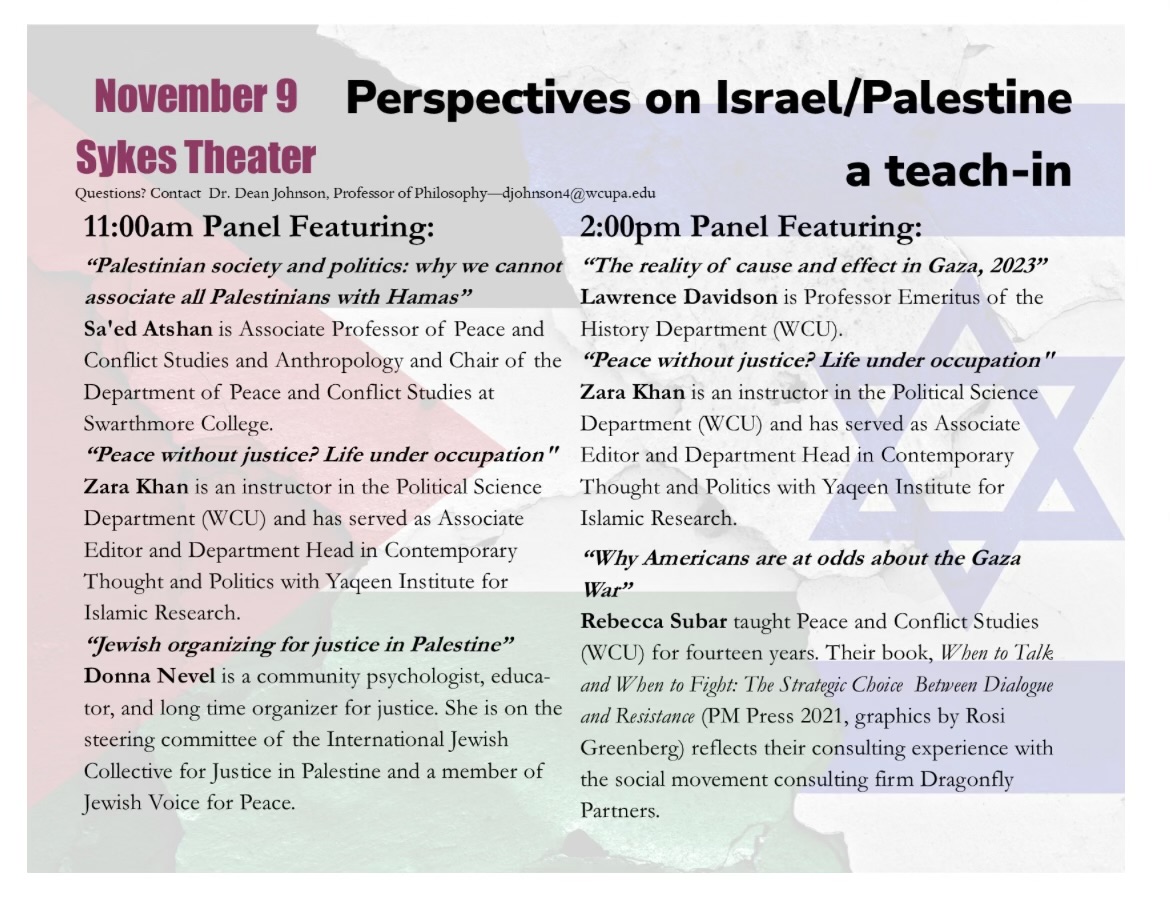Photo: Event flyer
Thursday Nov. 9 at 11 a.m., over a hundred students and professors gathered in Sykes Theater at West Chester University to hear presentations on the Israel/Palestine conflict. The event titled, “Perspectives on Israel/Palestine, a teach-in,” featured presentations by three different speakers who discussed the ongoing war in Gaza, as well as their hopes for future peace in the Middle East. The ongoing war in Gaza — a densely populated territory home to 2.4 million Palestinians — has claimed the lives of 11,078 Palestinians and over 1,200 Israelis as of Nov. 10, 2023 according to the United Nations Office for the Coordination of Humanitarian Affairs.
The audience was a diverse mix of students. In spite of the manifestly divisive nature of the subject matter, the atmosphere of the event was not tense; the audience remained respectful throughout.
Before the stage was given to the first speaker, Dr. Dean Johnson, a Professor of Philosophy and former Head of the Peace and Conflict Studies Program at WCU, gave an opening speech. Dr. Johnson began with the acknowledgement that everyone in attendance gathered there on the 85th anniversary of Kristallnacht — or Night of Broken Glass — which was a massive pogrom against Jews in Nazi Germany, Austria and the Sudetenland in 1938. Dr. Johnson held with a moment of silence for the victims of the antisemitic violence of Kristallnacht, as well as the victims of the current war in the Middle East — both Palestinian and Israeli.
The first speaker of the morning was Dr. Sa’ed Atshan. Dr. Atshan is an Associate Professor of Peace and Conflict Studies and Anthropology as well as the Chair of the Department of Peace and Conflict Studies at Swarthmore College. His 15-minute speech was titled, “Palestinian Society and Politics: Why We Cannot Associate All Palestinians with Hamas.”
Dr. Atshan, who is Palestinian and grew up in the West Bank, focused his speech primarily on calling for a ceasefire and condemned violence to civilians whether they are Israeli or Palestinian. The other speakers similarly condemned Hamas’s Oct. 7 attack, as well as the Israeli government’s response to it.
“International humanitarian law should be applied consistently across the board,” he said at one point in his speech.

While his demeanor was often witty and animated, Atshan emphasized that he was experiencing his own pain and mourning. His family had recently lost a loved one who had been sheltering in the Greek Orthodox Church of St. Porphyrius in Gaza. The church, according to Palestinian officials via Reuters, had been sheltering five hundred Muslim and Christian Palestinians and was hit by an Israeli airstrike. The strike killed 16 Christians; one of those Christians was Dr. Atshan’s relative. Atshan said that, in the wake of this tragedy, members of his family called to promote peace.
In his speech and in his recent article for the LA Times, Dr. Atshan shed light on Christian Palestinians, of which there are 1,000 in Gaza. He emphasized that Palestine has always had a historic religious heterogeneity and was the birthplace of all three Abrahamic religions, including Christianity. He himself is active in many Quaker institutions in both America and the occupied West Bank. In fact, Dr. Atshan stated that his Quaker education and activism were what motivated him to support a ceasefire in Gaza. Quakers, who belong to a Protestant sect of Christianity, have historically been pacificists.
Dr. Atshan ended his speech by saying, “If Israelis and Palestinians can call for non-violence, all of us in this room can do the same.”
The second speaker of the morning was Zara Khan, an adjunct professor of Political Science at WCU. Professor Khan’s speech was titled “Peace without Justice: Life Under Occupation,” and it focused on showcasing the daily life and struggles of Palestinians in the West Bank. Professor Khan recounted her experiences during a 2003 fact-finding mission in the West Bank. During this visit she saw what she described as grave abuses by Israeli soldiers against Palestinians.
Professor Khan said that the Israeli-occupied West Bank is filled with many military checkpoints that travelers are required to pass through when moving through roads in the region. During her speech, Khan recounted a point in her mission in which she and the other members of her group were allowed to pass through a military checkpoint because they were Americans, whereas another person who was Palestinian was arbitrarily barred from crossing. Khan said that this is the reality for many Palestinians in the West Bank who are told they cannot cross checkpoints, often without reason.

Describing the experience for Palestinians at checkpoints as consisting of “hassling and frustration,” Professor Khan highlighted the restrictions on freedom of movement imposed on Palestinians in the West Bank. She referenced a 2005 United Nations report which found that 61 Palestinian women were forced to give birth at Israeli Defense Forces (IDF) checkpoints between September 2000 and December 2004. Thirty-six of those babies died as a result.
Professor Khan, who is Muslim, drew upon her experience growing up among Jewish communities in Brooklyn, NY. She recounted the importance of the Sabbath day to those communities and contrasted the reality of the Sabbath in Brooklyn with the West Bank. In Jewish settler communities in the West Bank the Sabbath often comes with harsh curfews for Palestinians. Professor Khan noted that Palestinians can be shot by soldiers for leaving their homes during imposed curfews.
The third speaker of the morning was Donna Nevel. Nevel is a Jewish activist and community psychologist who often speaks in support of Palestinian human rights. She is involved with both the International Jewish Collective for Justice in Palestine and Jewish Voice for Peace. The title of her speech was “Jewish Organizing for Justice in Palestine,” and it called on members of Jewish communities to support a ceasefire in Gaza. She praised organizations like Jewish Voice for Peace — of whom she is a member — for their recent demonstrations at the Statue of Liberty and Grand Central Station.
“For those of us who are Jewish,” she said, “we need to demand that our community support — at the minimum — a ceasefire.”
Nevel lamented that her criticisms of the Israeli government and her pro-Palestinian advocacy often resulted in her being labeled “a self-hating Jew.” She also said that there is a difference between criticism of Israel and antisemitism.
“It is important to recognize antisemitism,” she said, “It is equally important to recognize what antisemitism is not.”
After the three speakers had each given their 15-minute speeches, the event concluded with a brief question-and-answer portion. The first question the three speakers were asked was, “What is the best action I can take as a college student to promote peace?” The speakers all expressed the importance of seeking education about the Israel/Palestine conflict and educating others. Dr. Atshan suggested urging lawmakers to alter their course of action in this conflict.
The speakers were then asked what their wishes were for a long-term solution to ensure peace in Israel and Palestine. Notably, none of the speakers expressed support for a two-state solution, instead emphasizing the need for both Israelis and Palestinians to be treated equally. Dr. Atshan said he supported the creation of a binational, one-state solution in which Israelis and Palestinians are granted equal treatment and rights. Khan and Nevel respectively called for an end to Israel’s occupation of the Palestinian territories and the right of Palestinian refugees to return to their homes.
Josh Czaja is a first-year Political Science major on the International Relations track. JC1029473@wcupa.edu

